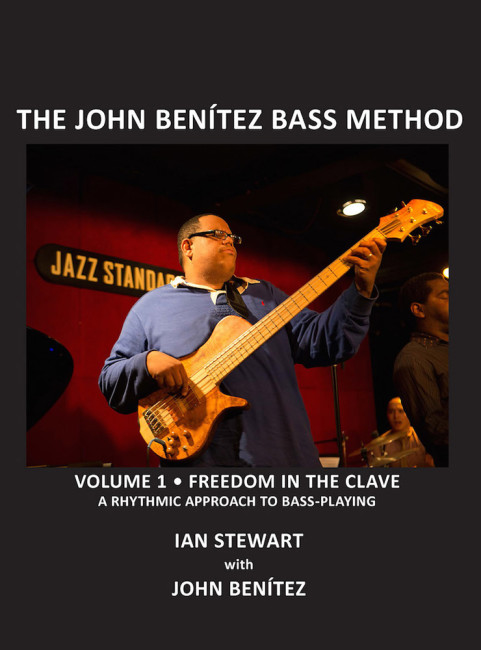Grammy-winning bassist John Benitez stands out in the world of music, especially in genres of jazz, Latin jazz and Pan-American. The composer, producer and bandleader has performed with Chick Corea, Wynton Marsalis, Tito Puente and John Scofield and was chosen by the U.S. Information Agency and the Kennedy Center to work as a jazz ambassador on a tour of South America.
It’s easy to see why locally born bassist Ian Stewart was drawn to Benitez. However, it was luck and hard work that introduced the pair and led to Stewart’s book, The John Benitez Bass Method, Vol. 1: Freedom in the Clave: A Rhythmic Approach to Bass Playing.

Stewart was raised on a solid diet of jazz-fusion, as he listened to Frank Zappa, King Crimson, Return to Forever and Weather Report. He started electric bass when he was 12 and upright at 16. After earning his jazz studies degree from SUNY Purchase in 2008, he relocated to Chicago’s Latin-jazz scene, followed by a stint with the progressive jazz-rock band Marbin from 2010 to 2012.
“A lot of what’s happened in the past few years was mostly a reaction,” Stewart explains. “Marbin was a significant part of my life for two years. I was all over the country 300 days a year. When I left the band, I went back to Chicago and found refuge, for whatever reason, in the Latin music scene.”
Within that scene, Stewart met Darwin Noguera and played with the Chicago Afro-Latin Jazz Ensemble and Noguera’s Evolution Quartet. He started playing with composer and multi-instrumentalist Hector Silveira and began delving into Timba and Cuban music. He eventually started writing for Timba.com, which is run by editor Kevin Moore.
“I went to New York City in September 2013 and that’s when I met John Benitez,” Stewart recalls. “I was writing concert reviews. I met John through a friend and sat in at a gig. He really enjoyed my playing. He said, ‘If you move to New York, I’ll recommend you for work.’ It was a no-brainer.”
Stewart saved enough money for the Manhattan move by May 2014. He was subbing for Benitez and still writing for Timba.com when he had an idea to write the book. He had been transcribing Benitez’s playing from tracks on a few albums he was on and thought to compile them.
“He wanted to do a method book,” Stewart says. “He had exercises he showed students and an overall teaching philosophy he wanted to share. I did my first transcription in July 2014, and the book was published on March 25, 2015.”
The book is the first in the Bass Method series that will compile Benitez’s methods developed over years of professional playing and giving private instruction. The first volume serves as a collection of rhythm exercises “designed to strengthen a student’s overall rhythmic confidence and awareness in regards to the clave (a rhythmic pattern in Afro-Cuban music), thus facilitating higher degrees of creativity and expression during performance,” according to the Amazon.com description.
Timba.com editor Moore helped edit and organize Stewart’s book. He self-published the work using Amazon.com and now sells consistently online. Stewart is currently working on two more books.
Stewart’s next musical project will be an album with Wilson “Chembo” Corniel. Land of The Descendents, which features Latin jazz styles from Cuba, Puerto Rico and Peru, will include musicians Frank Fontaine (saxophone), Darwin Noguera (piano), Joel Mateo (drumset), Kat McRae (vocals), Benjamin Sutin (violin) and James Zollar (trumpet).
Meanwhile, positive word of mouth for the Benitez tome is spreading among professional bassists. “Damian Erskine put a review up on Amazon,” Stewart says. “Professional players are just buying it on their own.”
The book also provides an enlightening preface helpful to all musicians, not just bassists. Comparisons are drawn between spoken language, and music and the importance of strengthening basic abilities, such as rhythm.
“The more ‘serious’ we get about music, often the more we become guilty of ignoring or undermining the reasons we started playing in the first place,” Stewart writes. “We started because we like the way it sounds, feels and because we wanted to play like and hopefully with, the musicians we admire. The closer we stay to this state of mind, the happier and more inspired we should remain.”
Stewart’s passion as a musician and writer also extends to the importance of music in culture. “My main concern is that people are less exposed to live music and art,” he says. “People will pay unbelievable amounts of money to see huge concerts where people lip-sync to prerecorded tracks but will leave a bar the moment a real band plays. Lack of music education in public school plays a big part. It’s been said that most of today’s popular music is written at a third-grade reading level, and judging by what I hear, I can agree. For too many people, music has become something that comes out of a computer and requires little to no effort to absorb.
“As musicians, we are supposed to challenge listeners. It is not our responsibility to worry about what people like or want. It’s other people’s responsibility to be able to understand what we’re doing and appreciate it on a higher level. I would challenge anyone to take a hard look at what they listen to and ask themselves, ‘What does this really say about me?’”
To order the book, visit Amazon or bassbooks.com.
Ian Stewart will present a free lecture on Timba music on Tuesday, Feb. 9, 3:30 p.m., at Onondaga Community College, 4585 W. Seneca Turnpike. The clinic will take place at the Recital Hall (P100) in the Academic II building. For information, call 498-2000.



